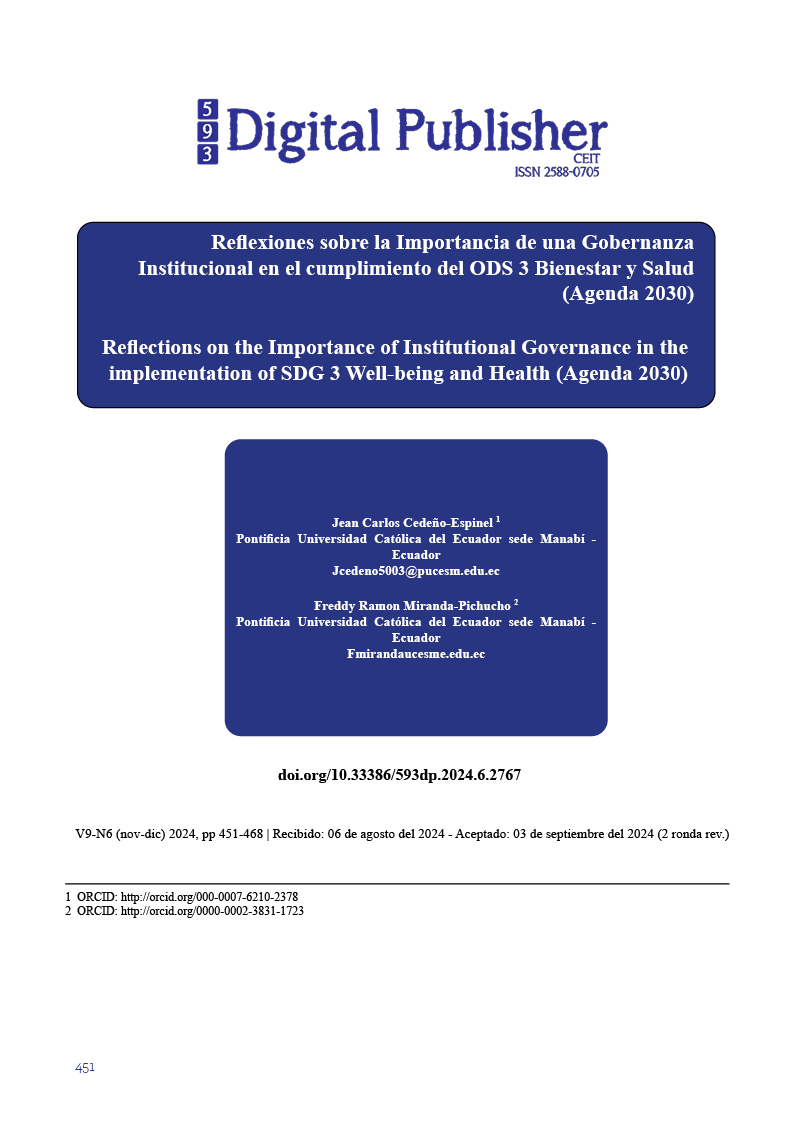Reflections on the Importance of Institutional Governance in the implementation of SDG 3 Well-being and Health (Agenda 2030)
Main Article Content
Abstract
The research has as a general objective: To reflect on the importance of institutional governance in the fulfillment of SDG 3 Well-being and health (Agenda 2030); to its in addition to two specific objectives: To identify the theoretical positions on institutional governance that give viability to sustainable development; and, to reveal the established aspects for the scope of SDG 3 Well-being and health (Agenda 2030). The design of the methodology has been based on the phenomenological-interpretative paradigm with a qualitative and non-experimental approach, configuring a documentary/bibliographic research, it is based on an epistemic reference such as the Grounded Theory of which axial matrix procedures are used, among which is the paradigmatic matrix, the matrix that allows to identify the process of constant comparison or theoretical saturation (Linking of the concepts with the phases of the documentary analysis) and the categorization matrix (Matrix of emerging findings), being in the latter a central category that collects all the elements that have arisen throughout the process of comparative analysis, this being called: Health governance. A contribution to its conceptualization.
Downloads
Article Details

This work is licensed under a Creative Commons Attribution-NonCommercial-ShareAlike 4.0 International License.
1. Derechos de autor
Las obras que se publican en 593 Digital Publisher CEIT están sujetas a los siguientes términos:
1.1. 593 Digital Publisher CEIT, conserva los derechos patrimoniales (copyright) de las obras publicadas, favorece y permite la reutilización de las mismas bajo la licencia Licencia Creative Commons 4.0 de Reconocimiento-NoComercial-CompartirIgual 4.0, por lo cual se pueden copiar, usar, difundir, transmitir y exponer públicamente, siempre que:
1.1.a. Se cite la autoría y fuente original de su publicación (revista, editorial, URL).
1.1.b. No se usen para fines comerciales u onerosos.
1.1.c. Se mencione la existencia y especificaciones de esta licencia de uso.
References
Andrade-Moreira, M.., & Vegas-Meléndez, H.. (2024). Estrategias de Gobernanza Sostenible que Impulsan el Desarrollo Local. Aportes de la Empresa Pública. Unidad de Estudio: E.P Manabí Produce. 593 Digital Publisher CEIT, 9(1), 430-447. https://doi.org/10.33386/593dp.2024.1.2208
Banco Mundial. (1986). Informe sobre el desarrollo mundial 1986. Oxford Universiry Press. https://documents1.worldbank.org/curated/en/701691468153541519/pdf/173000WDR0SPANISH0Box128708B00PUBLIC0.pdf
Barraza, C. (2018). Manual para la Presentación de Referencias Bibliográficas de Documentos Impresos y Electrónicos. http://www.utemvirtual.cl/manual_referencias.pdf
Bermeo-Yaffar, F., Hernández-Mosqueda J. y Tobón-Tobón, S. (2016). Análisis Documental de la V heurística mediante la cartografía conceptual, Ra Ximhai, vol. 12, núm.6, pp. 103-121. https://doi.org/10.35197/rx.12.01.e3.2016.05.fb
Bevir, M. (Ed.). (2010). Governance as Theory, Practice, and Dilemma. En The SAGE Handbook of Governance (pp. 1-16). SAGE.
Bolaños Garita, R. (2017). La investigación cualitativa en las Ciencias de la Administración: aproximaciones teórico-metodológicas. The National Administration Review , 8 (1), 25–45. https://doi.org/10.22458/rna.v8i1.1618
Brower Beltramin, J. A. (2016). En torno al sentido de gobernabilidad y gobernanza: delimitación y alcances. Daimon Revista Internacional de Filosofia, (67), 149-62. DOI: 10.6018/202011
Cadarso, P. (2001). Fundamentos teóricos del conflicto social. Siglo Veintiuno de España Editores.
Castillo-Rocuber, N. (2019). Acerca de los Paradigmas de la investigación educativa. https://www.ecured.cu/Investigaci%C3%B3n_educativa#Definici.C3.B3n_de_paradigma
Constitución de la República del Ecuador (2008). Decreto Legislativo 0 Registro Oficial 449 de 20-oct-2008 Ultima modificación: 13-jul-2011 Estado: Vigente. https://www.oas.org/juridico/pdfs/mesicic4_ecu_const.pdf
Corbin, J. y Strauss, A. (2002). Bases de la investigación cualitativa, técnicas y procedimientos para desarrollar la teoría fundamentada. Medellín: Editorial Universidad de Antioquia.
Denzin, N.K. (1970). Sociological Methods: a Source Book. Aldine Publishing Company.
Donolo, D. S (2009). Triangulación: Procedimiento incorporado a nuevas metodologías de investigación. Revista Digital Universitaria, 10 (8). http://www.revista.unam.mx/vol.10/num8/ art53/art53.pdf
Fraenkel y Wallen (1996). How to design and evaluate research in education (3rd. Ed.). New York: McGraw-Hill.
Guerrero-Dávila, G. (2015). Metodología de la investigación. México D.F, México: Grupo Editorial Patria. https://ezproxy.unisimon.edu.co:2258/es/ereader/unisimon/40363?page=20.
Glaser, B. (1978). Theoretical Sensitivity. Mill Valley: Sociology Press.
Glaser, B. (1992). Basics of Grounded Theory Analysis: Emergence versus Forcing. Mill Valley CA: Sociology Press.
Glaser, B. (2007). All is Data. Grounded Theory Review: An International Journal, 6(2), 1-22. Glaser, B. y Strauss, A. (1965). Awareness of Dying. Aldine.
Glaser, B. y Strauss, A. (1967). The Discovery of Grounded Theory: Strategies for Qualitative Research. New York: Aldine Publishing Company.
Kooiman, J. (2003). Societal Governance. En I. Katenhusen & W. Lamping (Eds.), Demokratien in Europa: Der Einfluss der europäischen Integration auf Institutionenwandel und neue Konturen des demokratischen Verfassungsstaates (pp. 229-250). VS Verlag für Sozialwissenschaften. https://doi.org/10.1007/978-3-663-09584-2_11
Longo, F. (2010). Ejes vertebradores de la gobernanza en los sistemas públicos. Un marco de análisis en clave latinoamericana. Revista del CLAD Reforma y Democracia, 46, 73-102.
Loorbach. D. (2007). Gestión de la transición: nuevo modo de gobernanza para el desarrollo sostenible. ISBN 978 90 5727 057
Lowdnes, V. y Mark R. (2013). Why Institucions Matter. The New Institucionalism in Political Science. Londres: Pal GRave Macmillan.
Macías-Guerrero, CP y Vegas-Meléndez, HJ (2023). Políticas Públicas Sociales Desde la Propuesta de una Gobernanza Institucional. Una Visión Reflexiva Desde los Gobiernos Autónomos Descentralizados. Revista de Derecho y Desarrollo Sostenible, 11 (11), 1448. https://doi.org/10.55908/sdgs.v11i11.1448
Martínez-Comeche, J.A. (1996). El mensaje documentario y el documento. En: López Yepes, José, ed. Manual de información y documentación. Pirámide. p. 48-62.
Martínez-Corona, J.I. y Palacios-Almón, G.E. (2019). Análisis de la Gestión para Resultados en el Marco de la Sociedad del Conocimiento. Revista Atenas, 3(47), 180 – 197.
Máxima Uriarte, J. (2020). Investigaciones documentales, definición y características. enciclopedia Delaware humanidades http://www.caracteristicas.co/investigacion-documental/
Molina Guzmán, A. (2019). Funcionamiento y gobernanza del Sistema Nacional de Salud del Ecuador. Íconos - Revista De Ciencias Sociales, (63), 185–205. https://doi.org/10.17141/iconos.63.2019.3070
Organización Panamericana de Salud (2017). Rectoría y gobernanza hacia la salud universal. Salud en las Américas 2017. https://www.paho.org/salud-en-las-americas-2017/uh-governance-es.html
Pinto Molina, María y Carmen Gálvez. (1996). Análisis documental de contenido: procesamiento de la información. Síntesis. (Bibliotecología y Documentación).
Plan Decenal de Salud 2022 – 2031. (2022). Ministerio de Salud Pública. Viceministerio de Gobernanza y vigilancia de la salud. https://www.salud.gob.ec/wp-content/uploads/2022/07/Plan_decenal_Salud_2022_ejecutivo.18.OK_.pdf
Plan Nacional de Desarrollo (PND, 2024-2025). Plan El Nuevo Ecuador. Gobierno del Ecuador. https://www.planificacion.gob.ec/wp-content/uploads/2024/02/PND2024-2025.pdf
Plumptre T, Graham J. Governance and good governance: international and aboriginal perspectives. Ottawa: Institute of Governance; 1999.
Programa de la Naciones Unidas para el Desarrollo (PNUD, 2007). La democracia de ciudadanía: Una agenda para la construcción de ciudadanía en América Latina. https://controlatugobierno.com/bibliografia/la-democracia-de-ciudadania-una-agenda-para-la-construccion-de-ciudadania-en-america-latina-pnud/
Pérez-Montoro (2004). Gestión del conocimiento en las organizaciones Fundamentos, metodología y praxis. Impresión: Gráficas Ápel. ISBN: 978-84-9704-376-2. https://diposit.ub.edu/dspace/bitstream/2445/123350/1/Pe%CC%81rez-Montoro%20%282008%29%20Gestio%CC%81n%20del%20conocimiento%20en%20las%20organizaciones.pdf
Ray, D., y Esteban, J. (2017). Conflict and Development. Annual Review of Economics, 9, 263-293. https:// dx.doi.org/10.1146/annurev-economics-061109-080205
Reyes-Ruiz, L. & Carmona Alvarado, F. A. (2020). La investigación documental para la comprensión ontológica del objeto de estudio. https://bonga.unisimon.edu.co/bitstream/handle/20.500.12442/6630/La%20investigaci%C3%B3n%20documental%20para%20la%20comprensi%C3%B3n%20ontol%C3%B3gica%20del%20objeto%20de%20estudio.pdf?sequence=1&isAllowed=y
Riessman, C. K. (1993). Narrative Analysis. Qualitative Research MethodsSeries, No. 30. Newbury Park, CA: Sage.
Rodríguez Sabiote, C.; Pozo Llorente, T.; Gutiérrez Pérez, J. (2006). La triangulación analítica como recurso para la validación de estudios de encuesta recurrentes e investigaciones de réplica en Educación Superior RELIEVE. Revista Electrónica de Investigación y Evaluación Educativa, vol. 12, núm. 2, 2006, pp. 289-305 Universitat de València Valencia, España
Rodríguez-Vásquez, M. (2019). Gobernanza, gobernabilidad y conflicto como conceptos en la construcción de paz. Análisis. Revista Colombiana de Humanidades, 51(94), 101-119.
Sandole, D. (1998). A Comprehensive Mapping of Conflict and Conflict Resolution: A Three Pillar Approach. Peace and Conflict Studies, 5(2). https://doi.org/10.46743/1082-7307/1998.1389
Solorzano-Calero M. & Vegas-Meléndez H., (2022). Nuevos enfoques en la gestión pública para una gobernanza institucional inteligente. Revistas 593 Publisher.
Subirats, J. (2009). Gobernanza y educación. Revista Educación y vida urbana, 20 años de ciudades educadoras. Asociación internacional de Ciudades Educadoras.
Strauss, A. (1987). Qualitative Analysis for Social Scientists. Cambridge, Reino Unido: University of Cambridge Press
Stake R. (1999). Investigación con estudio de casos Segunda edición. ISBN: 84-7112-422-X. Ediciones Morata, S. L. (1999)https://www.uv.mx/rmipe/files/2017/02/Investigacion-con-estudios-de-caso.pdf
Tancara Q, C. (1993). La investigación documental. Temas Sociales, (17), 91-106
Vegas H. (2015). Gestión pública local, gobernanza y participación: una visión a partir del discurso de los actores sociales en Venezuela. Tesis Doctoral. http://mriuc.bc.uc.edu.ve/bitstream/handle/123456789/2119/hvegas.pdf?sequence=1
Vickery, Bryan. (1970). Techniques of information retrieval. Butterworths
Victoria, Ma., Victoria, Ma., y Victoria, Ma. (2018). Gobernabilidad y gobernanza del agua como bien común de la naturaleza. Revista de Derecho y Desarrollo Sostenible , 6 (1), 1–20. https://doi.org/10.37497/sdgs.v6i1.87



